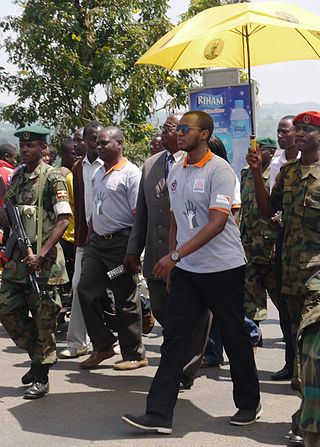See also
- Futa Tooro, a region in western Africa
Tooro may refer to:
Swahili may refer to:
Soga, or Lusoga, is a Bantu language spoken by the Soga people of the Busoga region in Eastern Uganda. With over three million speakers, it is one of the major languages of Uganda, after English, Swahili, and Luganda. However, it is largely restricted to the Busoga region, which is mainly within the natural boundaries of Lake Victoria to the south, Lake Kyoga to the north, the Nile river to the west and the Mpologoma ('Lion') river to the east of Namutumba district. It is tonal.
ISU may refer to:
Toro may refer to:

Bunyoro or Bunyoro-Kitara is a Bantu kingdom in Western Uganda. It was one of the most powerful kingdoms in Central and East Africa from the 13th century to the 19th century. It is ruled by the King (Omukama) of Bunyoro-Kitara. The current ruler is Solomon Iguru I, the 27th Omukama.

Ankole was a traditional Bantu kingdom in Uganda and lasted from the 15th century until 1967. The kingdom was located in south-western Uganda, east of Lake Edward.

Tooro is a Bantu kingdom located within the borders of Uganda. The current Omukama of Toro is King Oyo Nyimba Kabamba Iguru Rukidi IV. King Oyo Nyimba Kabamba Iguru Rukidi IV took to the throne of Tooro kingdom in 1995 at the age of just three years, after the death of his father Omukama Patrick David Matthew Kaboyo Rwamuhokya Olimi III on August 26, 1995, at the age of 50.

In Uganda the most spoken language in the capital city is Luganda, followed by English, as all schools in Uganda use it in their studies due to the introduction of English during the colonial period. English is also the language of business and judicial matters. Most spoken after Luganda and English is Swahili. This language is more common in neighbouring Kenya and Tanzania. Swahili is taught in schools as an optional additional language and it is mostly spoken by the Ugandan army. In 2005, there were talks to include Swahili into as the second official language as it was seen as neutral, however this is still not ratified by the government.

The Omukama of Tooro is the name given to the king of Tooro, one of the East African kingdom of Tooro. The kingdom was founded in 1830 by Omukama Kaboyo Olimi l who was the son of Kyebambe lll Nyamutukura, the king of Bunyoro. Since that time, Tooro existed as an independent kingdom until 1967 when President Apollo Milton Obote banned all kingdoms in Uganda. The kingdoms were reinstated as cultural institutions in 1993.
Soga may refer to:

Rukirabasaija Omukama Oyo Nyimba Kabamba Iguru Rukidi IV, King Oyo, is the reigning Omukama of Tooro, in Uganda. He was born on 16 April 1992 to King Patrick David Mathew Kaboyo Olimi III and Queen Best Kemigisa Kaboyo. Three and half years later in 1995, Oyo ascended the throne and succeeded his father to become the 12th ruler of the 180-year-old Kingdom of Tooro.
Tooro, or Rutooro, is a Bantu language spoken mainly by the Toro people (Batooro) from the Toro Kingdom region of western Uganda. There are three main areas where Rutooro as a language is mainly used and they are Kabarole District, Kyenjojo District and Kyegegwa District. Rutooro is unique among Bantu languages as it lacks lexical tone. It is most closely related to Runyoro.
Katanga may refer to:
Runyakitara is a standardized language based on four closely related languages of western Uganda:

The Kingdom of the Banyakitara, also known as Union of Kitara(Union of Chwezi) or Chwezi Union and better known as the Kitara Empire, was an empire in East Africa. It existed in the great lakes region from around the early bronze age to about 500 C.E. During its growth under the mysterious Chwezi Kings., the (Empire of the sun, Empire of the moon) ruled much of the Nile valley and beyond during its peak., when the kingdom of Aksum disintegrated about 940 AD into the kingdoms of makuria, zagwe, Damot and Shewa., another kingdom split away in the south to form the great Empire of kitara., the empire encompassed of modern day Uganda, Eastern Kenya, eastern D.R. Congo, Rwanda, Burundi, Tanzania, Malawi, Zimbabwe and Zambia., the Google interface has been translated into Kitara in February 2010 by the Faculty of Computing and IT, Makerere University. It is also used in the Orumuri newspaper, published by New Vision Group.
Queen Best Kemigisa Akiiki is the Queen Mother of the Tooro Kingdom, based in Fort Portal city, Uganda. She is mother to Rukirabasaija Oyo Nyimba Kabamba Iguru Amooti Rukidi IV, the reigning Omukama of Tooro.
The Great Lakes Bantu languages, also known as Lacustrine Bantu and Bantu zone J, are a group of Bantu languages of East Africa. They were recognized as a group by the Tervuren team, who posited them as an additional zone to Guthrie's largely geographic classification of Bantu.
Nkore-Kiga is a language spoken by around 5,800,000 people living in the extreme southwest of Uganda. It is often defined as two separate languages: Nkore and Kiga. It is closely related to Runyoro-Rutooro.

The Toro people, Tooro people or Batooro are a Bantu ethnic group, native to the Tooro Kingdom, a subnational constitutional monarchy within Uganda.
The Rutara or Runyakitara languages are a group of closely related Bantu languages spoken in the African Great Lakes region. They include languages such as Runyoro, Runyankore and Ruhaya. The language group takes its name from the Empire of Kitara.